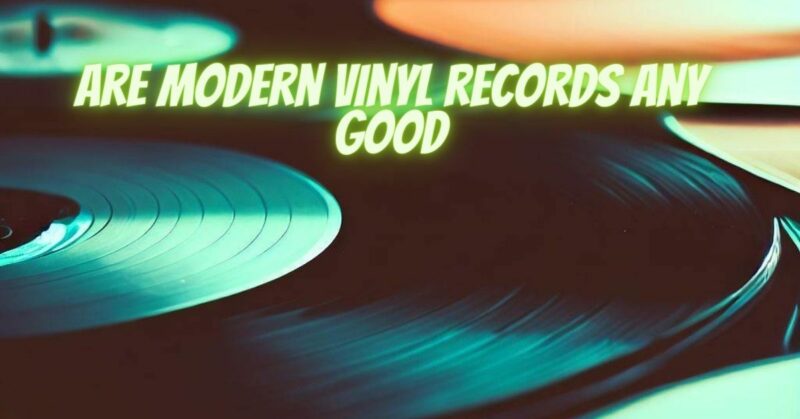Vinyl records have made a remarkable resurgence in recent years, captivating music enthusiasts with their unique charm and warm sound. However, as the popularity of vinyl continues to grow, some people may question the quality and fidelity of modern vinyl records compared to their historical counterparts. In this article, we will explore the topic and address the question: Are modern vinyl records any good?
- Vinyl Manufacturing Techniques: Modern vinyl records are manufactured using advanced techniques that have evolved over time. The production process involves cutting the audio onto a lacquer master, creating a metal stamper, and pressing the vinyl. While there have been advancements in precision and quality control, it’s important to note that the manufacturing process can vary between different pressing plants and labels. As a result, the quality of modern vinyl records can differ depending on the attention to detail and the materials used.
- Quality Control: One of the key factors influencing the quality of modern vinyl records is the commitment to quality control during the manufacturing process. Reputable pressing plants and labels invest in rigorous quality control measures to ensure that the records meet high standards. This includes inspecting the lacquer masters, checking for any imperfections, and maintaining consistency in the pressing. However, it’s worth noting that not all records undergo the same level of quality control, and issues like surface noise, warping, or pressing defects can occasionally occur.
- Mastering and Source Material: Another crucial aspect that affects the quality of modern vinyl records is the mastering and source material. The mastering process, which involves preparing the audio for vinyl, plays a significant role in how the music translates onto the record. A well-executed mastering process can enhance the sound quality and optimize the dynamics for vinyl playback. However, if the mastering is poorly done or the source material is of low quality, it can result in subpar sound reproduction.
- Record Labels and Pressing Plants: The choice of record label and pressing plant can greatly influence the quality of modern vinyl records. Established labels and pressing plants with a reputation for quality are more likely to prioritize the use of high-quality materials, employ experienced engineers, and invest in proper equipment. Researching labels and pressing plants known for their commitment to quality can help ensure a better vinyl experience.
- Personal Preference and Subjectivity: It’s important to acknowledge that the appreciation of vinyl records is also subjective and influenced by personal preferences. Some listeners appreciate the warmth, depth, and character of vinyl’s analog sound, even if it comes with inherent imperfections. Others may prefer the convenience and pristine sound of digital formats. Ultimately, what constitutes “good” vinyl is subjective and depends on individual tastes and expectations.
Conclusion:
The quality of modern vinyl records can vary depending on various factors, including manufacturing techniques, quality control measures, mastering, and source material. While many modern vinyl records offer excellent sound quality and provide a nostalgic and immersive listening experience, it’s important to be mindful of potential variations in quality between different releases. Researching reputable labels and pressing plants, reading reviews, and inspecting the record before purchase can help ensure a satisfying vinyl experience. Ultimately, whether modern vinyl records are “good” is a subjective judgment based on personal preferences and the desired listening experience.


